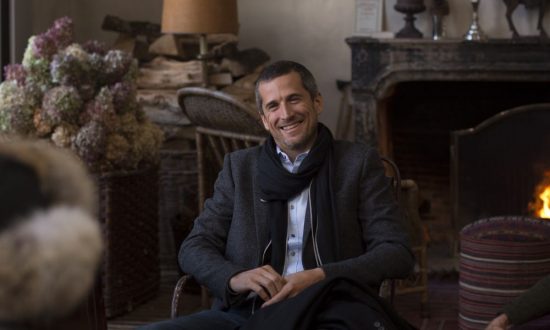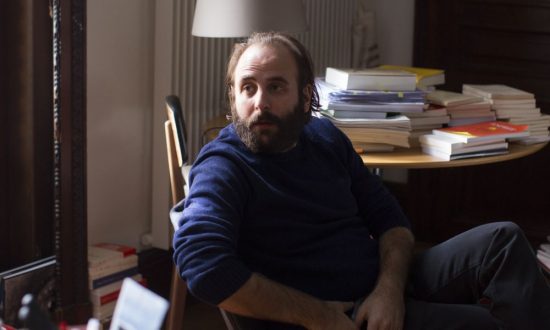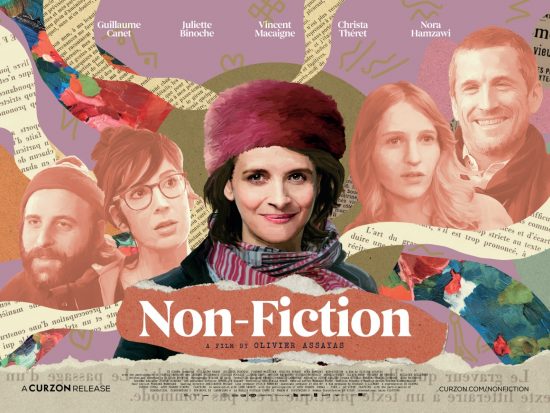Review: Non-Fiction – “Unapologetically French, and all the better for it”
There’s a sequence late on in Olivier Assayas’ zippy literary comedy, Non-Fiction, in which Juliette Binoche’s character, Selena, agrees to make contact with the real Juliette Binoche for an audiobook recording session. This level of self-awareness is present throughout the film’s breezy duration, making each scene tick with effortless charm.
Sure, you could look at it as pretentious, or self-obsessed (an unfair critique for a large pool of French cinema; particularly titles about the bourgeoisie), but the tone and context here is just so airy. Assayas delicately mocks the principals and validations of a transitional period in a beloved culture’s identity in a manner that’s referential, personal, and above all else, enjoyable.
Set in the Parisian publishing world – one alive with swanky cafés, and trendy but uncomfortable furniture – two men are suffering. Clashing over creative differences, a changing industry, and well, women. Alain Danielson (Guillaume Canet) is an esteemed editor at a large publishing house; one reluctantly agreeing to demands from a developing readership, which calls for more eBooks and blogs, as opposed to dust jackets. His client, Léonard Spiegel (a brilliant Vincent Macaigne) is a scruffy, controversial author; one whom has been riding a fairly consistent decline in book sales and new readers.
Spiegel is frequently criticised for his novel’s recurring characters, stories, and themes; many of which are deemed “auto-fiction”. He sows himself into the fabric of each text, as if an outlet for his many questionable secrets. There are real people, real scenarios, and real lives are retold in unglamorous detail here. His latest work leaves the duo at loggerheads; Alain is not willing to publish, and Léonard is not willing to amend. All the while the two men find themselves creatively torn, they are also emotionally torn, as they both attempt to manage a string of affairs – some of which are simply too close to home.
Assayas is one of the most prolific and celebrated French creators at large today. He refuses to work within rigid genre conventions, as perfectly displayed in Personal Shopper (2016), Clouds of Sils Maria (2014), and Summer Hours (2008), to name but a few. His films never take on a single form or shape; rather an overarching colourisation of cinema’s rich and eclectic palette. With Non-Fiction, it’s about the closest he’s gotten to a screwball comedy; albeit one with quick-fire dialogue about politics, social media, sexuality, consumerism, elitism, and pretty much everything in-between.
Suffice to say, this isn’t a thematically light film, despite its tone and style feeling as such. The subject matter is hefty and complex, yet handled in digestible manner, and characters race through lines in his punchy, hire-wired script at 100mph. If you zone out, even for a moment, you’ll miss a gag. Despite its rapid pacing, there are also moments of calm here. Assayas’ cast aren’t merely talking heads; they are fully-fleshed and realised – each with nuances that are explored in a number of intimate, focused sequences.
There are also a handful of expansive, long-running gags in the film which are completely side-splitting. In particular, a recurring quip about Michael Haneke’s sobering masterpiece, The White Ribbon (2009), is delightfully deranged. Equally, some scenes are gloriously awkward and uncomfortable – usually surrounding Léonard and the little digs life pokes at him along the way. An excruciating moment at a bookshop event in which members of the public unleash their united displeasure towards the author is a massive highlight.
Collectively, the performances are all top calibre. Binoche – a true darling of French cinema – frequently collaborates with Assayas, and their partnership shines here. The director enables Binoche to energise the scene; never harnessing her down and enabling her the opportunity to rattle to-and-fro dialogue with her trademark panache. She is a key focal point of the film; the wife of Alain, who expects foul play on her husband’s behalf.
Binoche’s scenes shared with Macaigne’s bedhead scribe lend to some of Non-Fiction’s best brushstrokes. The pair often transition from adult humour to an unmistakable loneliness which is equal parts hilarious and heartfelt. Selena, an actress becoming tired and typecast in a successful television show, is in many ways reflective of Léonard. He too is trapped in a creative cycle; regurgitating the same text under a different name, and constantly feeling at distance with himself outside his pages. It is a delicate yet deliberate splash of subtext which rings tenderly throughout.
Canet is excellent here, too. Alain is a much more playful and spirited character for the esteemed actor, who channels the humour and scholarship with dignity. Often Canet can be found in gripping thrillers or meaty dramas, but here he relaxes into a softer, squishier role, and it’s great to see. His intellectual sparring with Macaigne and in particular, Christa Théret is quite simply joyous.
Théret plays Laure d’Angerville – a new employee at the publisher who is ushered in to kick-start the transition to digital publishing. Alain, a clear romantic for traditionalism, regularly has his feathers ruffled by her new-age thinking and attitudes. The duo subtly makes space for Assayas’ clear social commentary on a changing landscape for all art forms; be that literature, cinema, television et al.
Non-Fiction is a self-assured, and self-aware yarn, which is equal parts human and humorous. Assayas crams in a bursting, bubbling screenplay – loaded with smarts, quips, and charm – into a supple 108min duration, and he enables his delightful ensemble cast to flourish. It’s a thoughtful and intelligent comedy – brimming with thematic and sociological value – but above all else, it’s unapologetically French, and all the better for it.
Non-Fiction is out now at Curzon cinemas and via Curzon Home Cinema, courtesy of Curzon Artificial Eye















